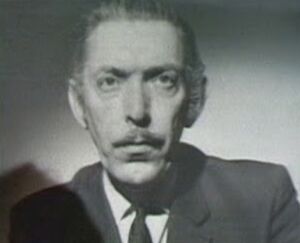Jack Kine: Difference between revisions
m (Bot: Adding {{uncredited}}) |
m (Bot: Cosmetic changes) |
||
| (40 intermediate revisions by 15 users not shown) | |||
| Line 1: | Line 1: | ||
{{real world}} | {{real world}} | ||
'''Jack Kine''' ([[20 September]] [[1921]]-[[14 January]] [[2005]]) was | {{Infobox Person | ||
| image = Jack Kine.jpg | |||
| birth date = [[20 September (people)|20 September]] [[1921 (people)|1921]] | |||
| death date = [[14 January (people)|14 January]] [[2005 (people)|2005]] | |||
| role = | |||
| job title = [[Visual effects designer]], [[extra]] | |||
| story = ''[[The Mind Robber (TV story)|The Mind Robber]]'' | |||
| time = 1968, 1970 | |||
| non dwu = | |||
| imdb = 0454344 | |||
| official site = | |||
}} | |||
'''Jack Kine''' ([[20 September (people)|20 September]] [[1921 (people)|1921]]-[[14 January (people)|14 January]] [[2005 (people)|2005]]<ref>[http://www.independent.co.uk/news/obituaries/jack-kine-17373.html The Independent]</ref>) was the [[visual effects designer]] for the ''[[Doctor Who]]'' television story ''[[The Mind Robber (TV story)|The Mind Robber]]''. | |||
Kine's career had been a fairly long one before coming into ''Doctor Who''. He has credits going back to at least the early | He was later seen as "[[the Leader]]" on the ''UNITY IS STRENGTH'' poster, as well as a framed black-and-white photograph on the wall of the [[Alastair Lethbridge-Stewart|Brigade Leader]]'s's office, in ''[[Inferno (TV story)|Inferno]]'' episode three. ([[DWM 305]]) | ||
== External | |||
Kine also provided the special effects for the ''It's a Square World'' sketch ''[[The Doctor's New Invention (TV story)|The Doctor's New Invention]]''. | |||
== Career == | |||
[[File:TheLeader.jpg|thumb||300px|Jack Kine as "the Leader" in ''Inferno''.]] | |||
Kine's career had been a fairly long one before coming into ''Doctor Who''. He has credits going back to at least the early 1950s. Notably, he had been a [[special effects]] designer on the various {{wi|Bernard Quatermass#In television (1950s)|Quatermass}} series of the 1950s. ''The Mind Robber'' came late in his television career, and may have in fact been his final television credit. | |||
== Footnotes == | |||
{{reflist}} | |||
== External links == | |||
{{imdb name|id=0454344}} | |||
{{NameSort}} | {{NameSort}} | ||
[[Category:Doctor Who visual effects designers]] | [[Category:Doctor Who visual effects designers]] | ||
[[Category:Doctor Who uncredited cast]] | [[Category:Doctor Who uncredited cast]] | ||
[[Category:Actors who portrayed the Third Doctor]] | |||
[[Category:Actors who portrayed the Doctor]] | |||
Latest revision as of 20:54, 3 November 2024
Jack Kine (20 September 1921-14 January 2005[1]) was the visual effects designer for the Doctor Who television story The Mind Robber.
He was later seen as "the Leader" on the UNITY IS STRENGTH poster, as well as a framed black-and-white photograph on the wall of the Brigade Leader's's office, in Inferno episode three. (DWM 305)
Kine also provided the special effects for the It's a Square World sketch The Doctor's New Invention.
Career[[edit] | [edit source]]
Kine's career had been a fairly long one before coming into Doctor Who. He has credits going back to at least the early 1950s. Notably, he had been a special effects designer on the various Quatermass series of the 1950s. The Mind Robber came late in his television career, and may have in fact been his final television credit.
Footnotes[[edit] | [edit source]]
External links[[edit] | [edit source]]
- Jack Kine at the Internet Movie Database

